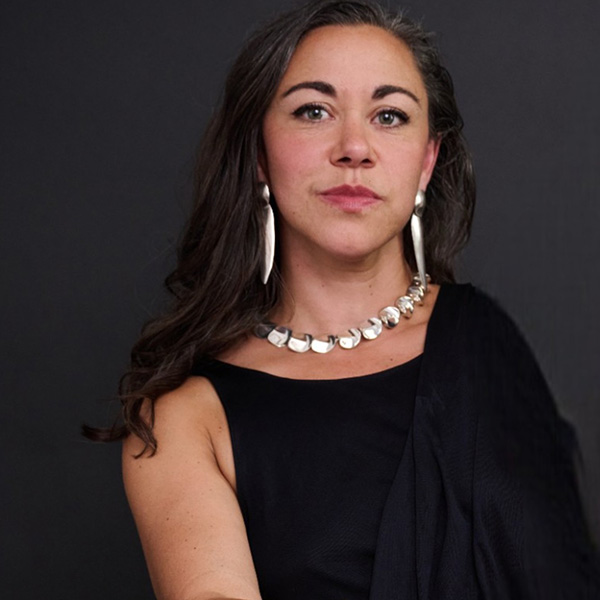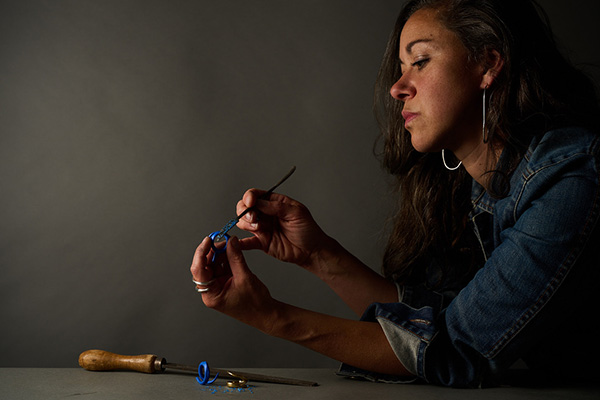
One of the jewelers participating in the Feb. 28 nationwide Economic Blackout, Ariana Boussard-Reifel (pictured) of New York City, says she is doing it as a personal and professional statement about how small business can take a stand against powerful corporate interests.
Boussard-Reifel says that during the 24-hour period she is closing down sales on the websites for her jewelry brand and her vintage etail store Marteau.
To support the Economic Blackout, consumers are encouraged to refrain from making any purchases, in stores or online, at large retail and fast-food chains and from using credit cards. The goal, organizers say, is to disrupt the economy and send a message about corporate greed.
“Personally, I am going to participate by not doing any transactions with big payment processors that day, and I am going to avoid buying things for my business,” Boussard-Reifel says. “But I wanted to take it one step further.… It’s apparent we’re at a point of crisis now where money is the best tool we have to exact change.”
The Economic Blackout started through the advocacy organization People’s Union USA, and has been promoted by celebrities including Bette Midler and John Leguizamo and artists such as Martha Rich. Participating in the Economic Blackout does allow essential purchases from small, local businesses using cash.
“It’s not about being on the left or right,” Boussard-Reifel says. “It’s about small business. Small business can save America. We do have the ability to make a real difference. If we as small-business Americans follow our own hearts and our own ethics and link our money to it, we can make a difference.”

Boussard-Reifel has widely advertised her participation, adding a banner to her websites, posting on social media, and sending out emails to her mailing list subscribers explaining her stance.
The reaction from clients and followers has been mostly positive, she says, with one of her social media posts getting reshared more than 200 times. Boussard-Reifel has also received some emoji eye rolls and critical comments, but says she is more than happy to live with them as an artist and business owner.
“I wanted to make what I’m doing very public, partly to give other small businesses the courage to also make a statement,” says Boussard-Reifel. “Standing up and being political hasn’t cost me much. Instead, it’s help me create a community and a customer base who feels involved in my work and who want to participate. That makes my business stronger.”
This is not Boussard-Reifel’s first political statement as a business owner—she held a “Not My President’s Day Sale” during Donald Trump’s first term and in 2025. She also has attended rallies and raised funds in support of women’s reproductive rights.
“I’m not making my jewelry for everyone. I don’t design for everyone. I want it to be meaningful to some people—and that’s the same way I run my business,” Boussard-Reifel says. “I want some hearts to swell and feel a connection with what I’m doing. And if that also turns someone away, I’m okay with that.”
A second Economic Blackout is planned for April 18, and the People’s Union has expanded the movement with weeklong boycotts of specific companies: Amazon (March 7–14), Nestle (March 21–28), Walmart (April 7-14), and General Mills (April 21–27).
“That is what is being used against us right now—it is money. The desire for money, the desire to hoard money, the desire to direct money to certain places,” Boussard-Reifel says. “On the other side of that scale, I can say how I use money, and I can use it to make a difference. That is more powerful than any other activism I’ve done in my life.”
(Photos courtesy of Ariana Boussard-Reifel)
- Subscribe to the JCK News Daily
- Subscribe to the JCK Special Report
- Follow JCK on Instagram: @jckmagazine
- Follow JCK on X: @jckmagazine
- Follow JCK on Facebook: @jckmagazine






